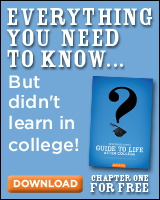Ice Cream for Dinner, and Other Small Tips for Saving Big Money

Graduation from my Masters program is near. No permanent job is in sight. Money-saving schemes loom to the fore of my awareness. Fortunately, I am a rat! “Resourceful”, “scavenger”, “survival”—no, “danger”—is my middle name. Here are some money-saving tips: drop ‘em like they’re hot…
Make your own coffee. I know, this is a controversial point. A great joy in my life is sampling different brews from baristas around town. But even making just your morning coffee instead of buying can save as much as 30 bucks a week. You could see Iron Man, Indiana Jones, and Prince Caspian just by brewing your own for a week. Plus, you get to wake up like these guys.
Drink water. I’ve gotten in the habit of carrying around a Gatorade bottle and filling it up at all times, rather than buying drinks. Not only does this save me as much as 20 or 30 bucks per week, but I’m also ridiculously hydrated at all times. Hydration is sweet. I don’t why. But it is true.
Eat ice cream. Seriously. You can buy a pint of good ice cream—Ben and Jerry’s, Häagen-Dazs, Breyer’s—for about five bucks. It’ll have about 1200 calories—almost half of the suggested daily intake. As far as buy-your-own meals go, it’s healthy: low sodium and high in calcium. Plus, ice cream is just really, really tasty. Consider eating a pint as your main meal a few days a week.
Take a multi-vitamin everyday. I asked a nutrition professor of mine about this, and he said he takes one whenever he can remember. Looking at the nutritional content on the back of the bottle, it seems like taking one is the equivalent of eating a huge plate of fruits, vegetables, and fiber. Though this is not at all the case—nutrients in a vitamin pill aren’t absorbed nearly as readily as nutrients in food—there is a marked benefit, and it can’t hurt. It’s hella easy and cheap to take a tablet every night when you brush your teeth. Plus, whenever someone gets in your grill about eating right, you can say, “Relax bro, I take a multi-vitamin every day.”
Don’t buy toilet paper. The philosopher Jacques Derrida writes eloquently of the bricoleur: he who constructs his language system out of the tools that surround him. The bricoleur scavenges, imbibes in his context, and creates his language based on these pre-existing materials. Derrida was responding especially to the onto-theological bent of the German philosopher Martin Heidegger, but we can extend Derrida’s point just as pertinently to the arena of taking dumps. Find yourself spending too much money on toilet paper? Create wiping materials from the tools that surround you: old socks, boxers, napkins from restaurants, and The Sunday Times are all fair game.
Change your mindset. As Bill Bryson reminds us: “There is always more toothpaste in the tube. Think about it.” You might think you’re down to your last drop of shampoo, your last quarter for laundry, your last clean shirt, or your last bit of toothpaste. Fortunately, this just isn’t true. There is always more, even if it means wetting your towel and scrubbing the stains off a t-shirt from your laundry bag. Down to your last ounce of energy? There is always more. Think about it.







Comments
(1)Seriously Herzberger, old socks?
POST YOUR COMMENT